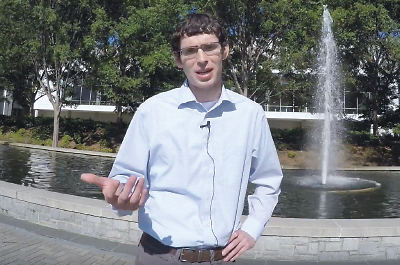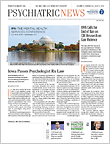A simple, reliable, and objective tool to help identify patients experiencing prodromal psychotic symptoms would be invaluable not only to psychiatrists but also to primary care providers, and biomedical engineer Jim Schwoebel thinks he may have found that tool. He was the winner of the Innovation Laboratory at APA’s 2016 Annual Meeting in Atlanta.
Schwoebel is developing a diagnostic speech test, which analyzes both the recorded speech and a transcript of that speech for details like maximum phrase length, word coherence, and use of determiner words (such as a, an, the, this). Combining these semantic and syntactic elements can reveal a risk score that identifies the likelihood that someone is experiencing a psychotic episode.
The seeds of this idea started a few years back after Schwoebel’s brother was diagnosed with schizophrenia.
“I had been sensing that something was off about my brother’s speech, so after he was officially diagnosed, I looked more closely at his text messages before his psychotic break and saw noticeable abnormalities,” said Schwoebel.
Schwoebel, a 2013 graduate of Georgia Tech with a degree in biomedical engineering, has long been fascinated by natural language processing but saw an opportunity to apply it in a way that could help others going through mental difficulties like his brother.
He began developing some simple models but had a significant breakthrough when he read an intriguing study by researchers at Columbia University and Brazil on using automated speech processing to distinguish at-risk individuals who later did or did not transition to psychosis (
Psychiatric News, November 6, 2015).
“As soon as I read it, I said, ‘This model is so simple and elegant. A company needs to get this technology out there.’ ”
That’s where the business side of Schwoebel kicked in—he’s also a founder of NeuroLaunch, whose website describes the company’s goal as “removing barriers for the most promising neuro-startups [to] sustain the world’s most robust community of neuroscience innovators, investors, and thought leaders.” Schwoebel has developed apps for multiple platforms, including iOS devices and the new Alexa device from Amazon, and he is raising seed money to spearhead some pilot studies.
In that regard, receiving the $2,500 prize for winning the Innovation Lab was a boost, though even without that, attending the APA meeting was a wonderful opportunity to get his idea out to potential investors and research collaborators, he said.
“It was also great to gain clinical insight on what the problems are in psychiatry, and other people at the meeting brought up cases where our apps could be used that I would not have thought of,” he said. “While we were aiming for primary care, one great example brought up was emergency rooms, where our speech test might help distinguish if a psychotic episode was due to an illness or drug use.”
Schwoebel also got details on places that would have databanks of oral and written speech that might help him test, refine, and expand the power of the processing software.
“I imagine doing this lab for the first time was challenging, but I applaud APA for getting involved in startups,” Schwoebel told Psychiatric News. “To transform psychiatry, we need to adopt these new forms of technology.” ■

